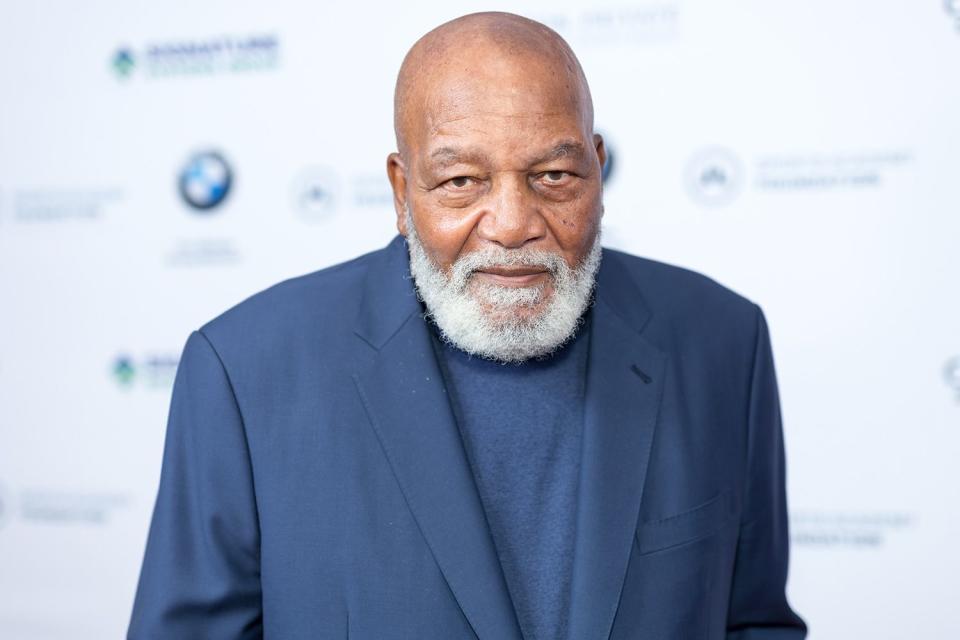Jim Brown, the legendary Cleveland Browns fullback who also became known beyond his NFL stardom as a Hollywood action hero and civil rights advocate, died Thursday at his home in Los Angeles. He was 87.
His wife, Monique Brown, said Friday in a statement posted to Instagram, “To the world, he was an activist, actor, and football star. To our family, he was a loving husband, father, and grandfather. Our hearts are broken .”
Widely regarded as one of the greatest players in pro football history, Brown was chosen as the NFL’s Most Valuable Player three times and led the Browns to a championship in 1964.
After nine seasons, he left the NFL to pursue acting full-time. His most notable screen projects included a turn as a military felon in The Dirty Dozens and roles opposite Rock Hudson in Ice Station ZebrasRaquel Welch in 100 Riflesand Pam Grier in Mars Attacks. More recently, Brown was one of four key figures represented in Regina King’s film One Night in Miamiin which he was portrayed by Aldis Hodge.
Brown was also a committed social activist and a barrier-breaking sports announcer, though his life was not without controversy and his legacy was marred by allegations of violence against women.

Greg Doherty/Getty Images Jim Brown
Jim Brown was born Feb. 17, 1936, on St. Simons Island, Ga. He was a sports prodigy at high school in New York, excelling in football, baseball, basketball, track and other sports.
The Cleveland Browns drafted him as the sixth overall pick in the 1957 NFL draft, and he spent his entire nine years in the league playing for the team. Brown regularly broke rushing records and he was selected for the Pro Bowl every season that he played professional football.
Brown made his screen debut in 1964, appearing as a buffalo soldier in the Western film Rio Conchos. He then went on to one of his most iconic roles, as Robert Jefferson in 1966’s The Dirty Dozens. When the production on the film ran long, Brown was threatened with being fined daily for missing training camp. Instead, he chose to retire from the NFL as the league’s all-time leading rusher, making the announcement from the set of The Dirty Dozens.
Brown starred in the film opposite Lee Marvin, Charles Bronson, Ernest Borgnine, and more as one of 12 convicts sent to France in the run-up to D-Day to locate and assassinate German officers. Marvin reportedly quipped of Brown, “Well, Brown’s a better actor than Sir Laurence Olivier would be as a member of the Cleveland Browns.”
From there, Brown was given his first leading role in 1968’s The Splits and enshrined himself as an action hero of the same year portraying a Marine officer in Ice Station Zebras.
Brown broke boundaries with his participation in one of the big screen’s first major interracial love scenes, sharing a steamy scene with Raquel Welch in 1969’s 100 Rifles. In a major coup, Brown was billed above both Welch and Burt Reynolds on the film.
Other notable titles of the era included Dark of the Sun; Slaughter; Black Gunn; El Condor; and Tick, Tick, Tick. Brown later branched out into television, appearing on series such as Knight Rider, The A-Teamand CHips.
His screen career spanned five decades and included films such as Draft Day, The Running Man, Any Given Sunday, Three the Hard Ways, Fingers, I’m Gonna Git You Suckaand He Got Game.
Brown also made waves in 1974 when he posed in the nude for Playgirl and became one of the only celebrities to allow use of full-frontal photographs.
He cited his investment in civil rights and desire to be a part of social movements in the 1960s as further reasons for leaving the NFL. Brown organized the National Negro Industrial and Economic Union, and one of his most famous moments came in 1967 when he participated in a news conference to support Muhammad Ali’s refusal to be drafted into the service. An iconic photograph shows him alongside NBA legends Bill Russell and Kareem Abdul-Jabbar and NFL greats Bobby Mitchell and Willie Davis.
“I had a great appreciation for Harry Belafonte and Sidney [Poitier] and Sammy Davis [Jr.] They were all great in their own way,” Brown said in the documentary A Football Life. “But I was a physical actor, I was a hero… We needed that as African Americans.”
Brown’s other major career pursuit was in sports broadcasting. He became the first Black televised boxing announcer in 1965 and worked as a color commentator for the Ultimate Fighting Championship beginning in 1998. For the 1978 NFL season, he worked as an analyst reviewing games on CBS.
Brown released a memoir, Out of Boundsin 1989. He endured his share of legal troubles, mostly in regard to allegations and charges of assault and battery involving his romantic partners.
Brown remained devoted to the Cleveland Browns even after his retirement. From 2008 until his death, he served as an executive advisor to the team, building relationships with players and working on sponsored programs.
He also founded the Amer-I-Can program in 1988, dedicated to helping to rehabilitate gang members and assisting them in taking charge of their lives.
In addition to his wife, whom he married in 1997, Brown survived their two children.
Related content:
